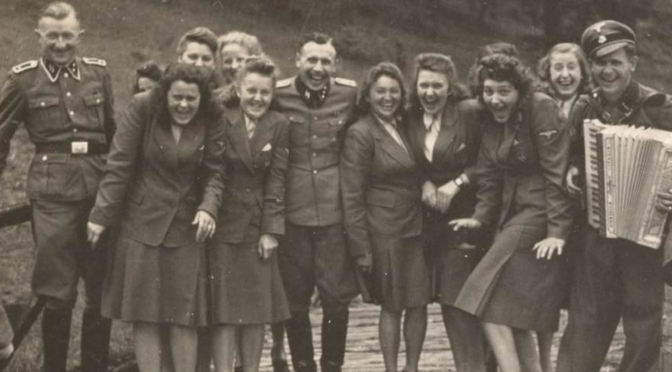Aw, look at the cheerful, playful, lighthearted colleagues laughing together! They’re just taking a few minutes off from their jobs—they oversaw prisoners at Auschwitz, the infamous Nazi death camp, in 1944. Yes, the happy folk in the uniforms are literal Nazis, members of the Schutzstaffel (aka the SS) taking a break from classifying, torturing, perhaps even killing the sick and terrified people whose lives they oversaw. Because even fascists and their apologists can be happy and have fun sometimes.
These smiling staff members were human, so they were naturally multifaceted, and even had some good qualities. Hey, even Hitler loved his dogs. The noted aviator and aeronautical designer Charles Lindbergh was brave and inspiring—but also a fascist sympathizer and appeaser. Coco Chanel was a groundbreaking fashion designer and style maker—who knowingly romanced, lived with, and spied for a powerful German diplomat during World War II. Robert F. Kennedy Jr., an activist and the namesake of his civil rights champion father, started his career as a respected environmentalist. But now he takes money from (and spews anti-scientific anti-vax rhetoric supported by) far-right American millionaires who also bankroll Trump. Former game show host Donald Trump himself makes many people laugh, shout, and feel excited about America—and regularly praises and says he wants to emulate dictators who imprison, torture, and murder their own people.
But it’s important to remember that people who do such things are still human. If we fully demonize and refuse to engage with those whose goal is to oppress and kill us, and show no respect to those who love them, we can’t get through to the millions of independent voters who are on the fence. If you demonize and dehumanize them, you fail to show them how people of good will can see and honor the humanity in those who disagree. You risk making yourself look like an ugly, irrational opponent. And you make compromise with dignity harder.
If you paint your opposition as less than human, you give strength and a rallying point to your enemies. Nobel Prize-winning diplomats like Jimmy Carter and Desmond Tutu made this clear, many times. Their ability to help long-term foes find common ground and face each other as human beings deserving of respect allowed them to broker peace and reconciliation deals that had long been inconceivable beforehand.
That doesn’t mean we should ever let down our guard, trust would-be oppressors or their apologists to have our best interests at heart, or fail to fight their dangerous, dehumanizing rhetoric and efforts to gain power. We must use every tool against their actions that the law allows.
And we can’t refuse to fight or take sides against our internal enemies just because their opposing candidates aren’t perfect. Lofty ideals sound lovely, but when a would-be dictator is at the door pointing an AK-47 at you and telling you how he looks forward to dismantling your democracy with his fascist friends, you don’t wait for Superman and Wonder Woman to show up. You push back, you support the candidates who are least objectionable, and you fight like hell to keep the fascists out of power.
Pragmatism is called for in such circumstances. Being “pure” and refusing to vote for a less inspiring (or even mediocre) candidate is no virtue when the alternative is a vote for a candidate who is an active danger to democracy. Nor does refusing to vote keep you clean in such a political environment. Refusing to vote is still a choice, and that choice has consequences, up to and including allowing the election of a dangerous person by an active minority of people. Don’t let fatigue, boredom with the news, or a temptation to be passive let you give away your ability to keep fascists out of power.
It’s such a delicate balance, remembering the humanity of the opposition and understanding their appeal while not underestimating their strength, letting down our guard, or failing to stand strong against lies and fascists. But we MUST do these things. Because eternal vigilance really IS the price of liberty.

